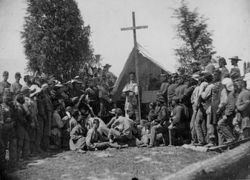 Confederate Baptists in the army and on the home front continue bewailing the inherently evil nature of the army of God’s chosen nation. Such is the debauchery of camp life that some argue there is no room for Christianity.
Confederate Baptists in the army and on the home front continue bewailing the inherently evil nature of the army of God’s chosen nation. Such is the debauchery of camp life that some argue there is no room for Christianity.
“The Camp, No Place to Become a Christian.” — Thus spoke a sick soldier, as we stood by his bed-side and enquired about his spiritual condition. He hoped that he would, yet, be a christian, but felt that it would be impossible to think seriously, or renounce his sins and give his heart to God, amid the excitement and turmoil and temptations of the camp. There may be others, among our readers in the army, who are excusing themselves from the performance of a known and acknowledged duty, in the same way. On account of the supposed difficulties in becoming a christian where they are, they are deferring the whole matter, until they shall have entered a new sphere of life, and been freed from their present trials and temptations.
Not all agree that the Confederate Army is spiritually hopeless. While few, if any, Baptists dispute the inherent wickedness of army life, some nonetheless see signs of religious hope.
Dr. Cross, chaplain of the Walker Legion writes to one of his church papers: “It is interesting to see how they flock to our nightly prayer-meetings, frequently in greater numbers than your Sabbath congregations in some of your city churches. I preach to them twice on the Lord’s day, seated around me on the ground; officers and all, in the most primitive order you can imagine. But the most interesting, probably the most useful part of my work, is the visitation of the sick. Every morning I go to the hospital, visiting the several apartments successively; in each of which I talk privately with the men, then read a passage of Holy Scripture, make some remarks upon it, and finish with prayer. However wicked and thoughtless they are in camp, they are all glad to see the chaplain when they are sick, and I have yet to meet with the first instance of any other than the most respectful and reverent attention. Indeed, my dear Dr., I think I have never occupied a field that afforded an equal opportunity for usefulness.
As the years of war unfold, the challenges of converting Confederate soldiers will prove as great as the task of saving the souls of foreign “heathens” that so occupied the missionary-mindset of pre-war Southern Baptists. Driving Baptist lamentations over the wickedness of soldiers is a gospel of individual morality and piety – distilled on the western and southern frontier of the early 19th century – that equates lostness with drunkenness, profanity, gaming (cards, dice, etc.), and other inappropriate personal behavior. Ultimately, many Southern Baptists in the post-war years pin Confederate defeat on the evils of camp life, while few blame the sin of slavery (or admit the enslavement of Africans is sinful).
Source: “The Camp, No Place to Become a Christian” and “Religion in the Army,” Biblical Recorder, December 11, 1861 (link)


